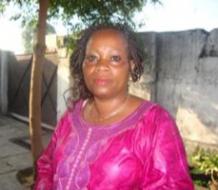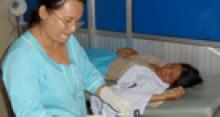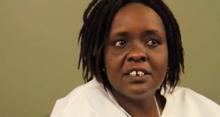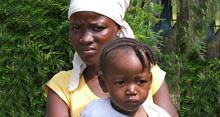Hero: Yvette Mulongo
Heroes
Exclusive one-on-one interviews with extraordinary individuals working on behalf of women, children, and families worldwide.

HER DREAM
My dream is to see Congolese woman enjoying full rights as women, including the happiness of being a mother, and the ability to give the best of herself to her children. My dream is to have a country where gender equity reigns and where woman will be valued and respected, not dishonored or raped on her way to the field. My dream is that woman will have the privilege of responsible pregnancies supported by essential reproductive care, and give birth to healthy children.
WHY SHE’S A HERO
Yvette Mulongo’s passion for her work is palpable. As she talks about her motivation for pursuing work in the field of women’s maternal health and reproductive rights in her native country, the Democratic Republic of Congo (DRC), she exudes compassion for her fellow Congolese “sisters” and “brothers” that no doubt sustains her noble ambition and hectic schedule.
A CHAT WITH HERO YVETTE MULONGO
IMOW: What is SANRU and what is your role there?
YVETTE: SANRU - IMA World Health is a faith-based organization working in partnership with other organizations to implement primary health care and reproductive and maternal health projects here in the DRC. I work as a technical adviser in Family Planning and Sexual and Gender Based Violence. My role is to support and manage field activities related to interventions.
IMOW: How did you become interested in the topic of contraceptive health and family planning?
YVETTE: As a child, I saw women die—neighbors losing mothers, friends losing mothers. It wasn’t until I became an adult, after I finished my studies, that I understood the connection between the early deaths of these women and our society’s endemic problems. Ignorance; illiteracy coupled with the low status of women; weak health due to numerous, close together, and early and late pregnancies; psychological trauma due to gender discrimination; war with its corollary effects on women’s lives; all condemn women to poverty and suffering. Very early on I became obsessed with these issues, which gave me the power to be an activist promoting family planning, optimal birth spacing, and fighting against gender discrimination.
IMOW: How did your experience as a mother prepare you for the work you do?
YVETTE: Many girls are victims of tradition. Many are forced to enter into marriage at age 12 or so for dowries, and soon become pregnant. If I hadn’t been schooled by my parents, I would be living in poverty, sadness, and a harsh reality like many of the other women in my country. However, even education could not save me from the damage caused by my lack of rights as a woman. My husband took my children from me when we divorced. He did this just to hurt me, knowing that I would have no way to reclaim them. That’s the root of my compassion for other mothers, and how my own trauma became the healing of others’.
IMOW: What are the factors that come into play that keep a woman from choosing if, when and how she has a child?
YVETTE: Many factors can play role in the women’s attitude toward this decision: acceptance or lack of understanding about the importance of spacing births, level of education, standard of living, religious beliefs, traditional beliefs, the role of the husband and his family, and geography. But there are also the institutional barriers that don’t promote or facilitate the use of contraceptives, or contraceptives aren’t available. Unfortunately, some nurses and doctors haven’t kept up with modern contraceptive health practices or had adequate retraining; they are still operating under old beliefs and outdated technology.
IMOW: What is the role of education?
YVETTE: Within the DRC and countries like ours in Africa, education can help to liberate women from the trap of poverty that drives them to poor health. Education also has the ability to connect women to the outside world, expose them to knowledge of others and help them to be more open-minded.
IMOW: Tell me about your most defining moments in your work—what makes you most proud?
YVETTE: We have followed up our targeted field interventions across the DRC with key family planning and sexual violence indicators. Compared to the first assessment, we have seen great progress related to our project objectives. This may sound scientific and clinical, but that is important—to measure your work and make sure that you are making a real impact, in a measurable way.
IMOW: How has the conflict in the DRC affected women from a health standpoint?
YVETTE: My country is facing the after effects of the devastation caused by a decade of war coupled with 32 years of dictatorship, chaos, and anarchy. All of these conflicts have had terrible consequences for the civilian population, and the people of the DRC continue to be burdened by them, especially women and children. Young adolescent girls are still subjected to sexual abuse, rape, recruitment by armed groups, trafficking, HIV/AIDS infection, and many reproductive health problems and complications from pregnancies. Such difficult experiences have long-term, devastating effects on their own lives, the lives of their children, their families, and the communities they live in. Many of these women are stigmatized and rejected by their communities. This marginalization of violence survivors leaves them unable to marry and forced to live in isolation on the margins of society—often with severe mental and physical health consequences.
IMOW: Can men be part of the solution? How?
YVETTE: Most definitely. We have implemented many strategies involving men in our country. Men play a key role in order to improve the condition of women life and their status. I have seen through my own experience that the commitment of men is crucial in promoting mother and child health.
IMOW: What aspect of contraceptive health do you think has gotten the least attention, and why?
YVETTE: Many Congolese women want to use contraception but their husbands are resistant, so they are using an injection contraceptive. This is an effective method, and in some cases protects the women who may be unable to openly use pills because if their husband found out they might be subjected to wrath, or worse. We are trying to make women aware of this option so the choice is hers and it is not visible.
IMOW: What’s the change you’ve been able to instigate that you feel most proud of?
YVETTE: I think it’s really just the work I do every day. I’ve been able to help women to access the best health care available before, during and after their pregnancies, and perhaps most importantly teach them how to stand up for themselves and their children in order to have the lives that they deserve. I sensitize and train clinical workers and communities to promote the benefits of birth spacing and safe motherhood in all parts of DRC. I’ve had the opportunity to educate and raise awareness at all levels regarding family planning and reproductive health—with families, political leaders, traditional chiefs, and women themselves in regions throughout the DRC. As a side project, I’ve established integrated literacy courses for women and girls in five regions of the DRC.
IMOW: Wow, I’m exhausted just listening! That’s fabulous. Who are your heroes?
YVETTE: My work was inspired by Dr. Richard Brown and his wife Judith, an American couple. They spent all their life in Africa teaching people the value and benefits of spacing births. They are the pioneers in making the connection between birth spacing and child and mother’s good health in Africa. Their fierce advocacy for the well-being of mothers and children in the context of this poor continent inspired my own deep conviction and work.
IMOW: What is the best lesson or advice your mother (or mother figure) ever gave you?
YVETTE: My inspiration for this work comes from my grandmother, who was a chaplain, and my father, who was a Methodist pastor. They taught me the value of offering consolation, and emphasized that the consolation found in prayer is one of the most important ways care for others and to alleviate the immense suffering we see around us. They were always ready to share meals with those who would have otherwise gone without, to console the mother who lost her child, or the young people with HIV/AIDS.
IMOW: What is one thing that many people don’t know about you?
YVETTE: I really like animals; they have sincere feelings, and are completely faithful. My own dog named Skype, I’ve had 9 years now. She’s very kind and always helps me calm my mind when I’m sad and tired!
Take Action
Help Yvette realize her dream for Congolese mothers.
Visit the SANRU website to get more information on her work or make a donation: www.sanru.org
Related Content
|
Prum Than empowers women to make safe reproductive health choices in her work at a reproductive and maternal health care clinic in Cambodia. |
Esther, once part of the Maasai tribe in Kenya, shares how one woman empowered her to become an activist and better mother. |
Sierra Leonian writer Aminatta Forna tells the story of a girl with a charismatic mother who was the favorite wife of her father, but also the target of judgments and criticisms from others in their community. |
Winnie is a single teen mom who lives in a small, floorless shack in a neighborhood outside Monrovia, Liberia. She became pregnant three years ago at 13 years old. Winnie is struggling to raise her son, Belesed, with very little support. |








